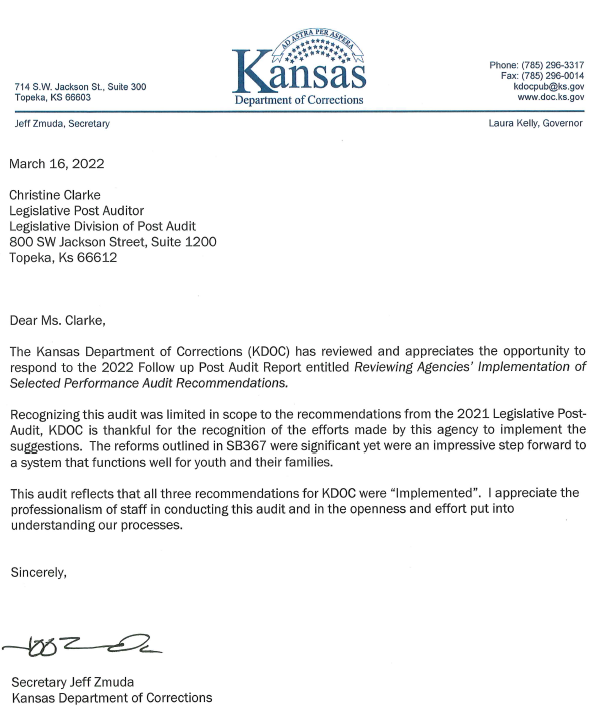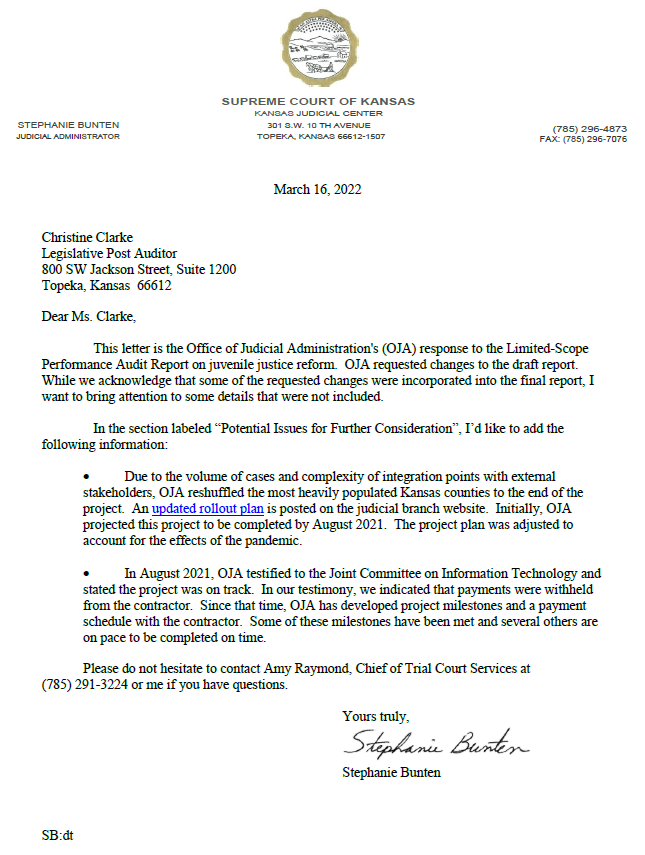Follow up Audit: Reviewing Agencies’ Implementation of Selected Performance Audit Recommendations
Introduction
The Legislative Post Audit Committee’s rules include a process to check on prior audit recommendations. That process has two primary components. First, the Post Auditor is required to follow up with each agency twice a year and have officials self-report on their progress in implementing recommendations. Second, the Post Auditor is required to prepare an audit proposal each year that lists “previous audit recommendations for which follow up audit work is necessary to independently ascertain whether such agency or other entity has implemented audit recommendations.”
On June 29, 2021, the Legislative Post Audit Committee approved this follow up proposal.
Objectives, Scope, & Methodology
Our audit objective was to answer the following question:
- To what extent have the Department of Corrections and Office of Judicial Administration implemented selected audit recommendations related to our audit on SB 367 Reforms?
To determine if the two agencies implemented the recommendations, we interviewed agency officials and requested and reviewed documents and processes. Documentation included certain confidential data reports, policies and procedures, project plans, legislative testimony, applications, application review documents, financial audits, internal tracking documentation, and contracts. More details about are included throughout the report as appropriate.
We only did what was necessary to evaluate whether the agencies implemented the recommendations. We did not reevaluate the programs or problems found in the original audit. Therefore, a finding that a recommendation was implemented does not mean that the agencies completely fixed any underlying problems.
Important Disclosures
We conducted this performance audit in accordance with generally accepted government auditing standards. Those standards require that we plan and perform the audit to obtain sufficient, appropriate evidence to provide a reasonable basis for our findings and conclusions based on our audit objectives. Overall, we believe the evidence obtained provides a reasonable basis for our findings and conclusions based on those audit objectives.
Audit standards require us to report our work on internal controls relevant to our audit objectives. For this limited scope audit, we reviewed whether recommended internal controls were implemented. We did not evaluate the effectiveness of those controls.
Our audit reports and podcasts are available on our website (www.kslpa.org).
The 2 agencies implemented 4 of the 5 recommendations we reviewed for this audit.
The Kansas Department of Corrections implemented all 3 recommendations, and the Office of Judicial Administration has implemented 1 and is currently implementing the other recommendation.
Our January 2020 audit of the juvenile justice reforms (Senate Bill 367) had recommendations related to improving and sharing available juvenile offender data across agencies and strengthening grant approval processes.
- The audit found that the Kansas Department of Corrections (KDOC) and the Office of Judicial Administration (OJA) did not have complete datasets of juvenile offenders under their supervision or custody. KDOC lacked historic data for juvenile offenders on Immediate Intervention Programs and not all counties reported information at the time. OJA could not readily identify all juvenile offenders under their supervision.
- The audit also found that KDOC and OJA did not share, stage, and analyze their agencies’ data to ensure that the state has a comprehensive dataset of its juvenile offenders.
- Lastly, the audit found KDOC did not have a process to ensure judicial districts used grant funds on appropriate community programs for juvenile offenders.
- To address these findings, we made several recommendations, 3 that were directed at KDOC, and 2 that were directed at OJA.
As of February 2022, KDOC has implemented all 3 recommendations.
- We spoke with agency staff and requested and reviewed documents to verify KDOC’s implementation of the 3 recommendations from our 2020 audit. Those documents included policies and procedures, a Memorandum of Agreement (MOA), grant applications, application review materials, financial audits, data reports and pertinent data fields, and internal tracking documents.
- Figure 1 shows our results.
| Figure 1: KDOC has implemented all 3 recommendations. | |||
| Recommendation | Status | Summary | |
| 1. KDOC should develop a complete dataset of juvenile offenders under their supervision or custody. | Implemented | KDOC implemented a statewide juvenile offender data system in 2018 called Athena. To ensure the data is complete, KDOC mandates data entry by Community Supervision Agency Officers and requires responses for all fields. Community Supervision Agencies also have an incentive to keep complete data because caseloads affect funding. We reviewed a recent data report which showed all judicial districts had reported juvenile offender data into the system. |
|
| 2. Once datasets are in place, KDOC and OJA need to cooperate to reach an agreement on how to share, stage, and analyze their agencies’ data so the state can have a comprehensive dataset of its juvenile offenders. | Implemented | KDOC, OJA, and DCF came to an agreement in an MOA on sharing certain juvenile offender data that went into effect on November 1, 2021. The MOA focuses on calculating recidivism (between KDOC and OJA) and analyzing statistics of Kansas’ crossover youth (between KDOC, OJA, and the Department for Children and Family Services). The MOA focuses on calculating recidivism (between KDOC and OJA) and analyzing statistics of Kansas’ crossover youth (between KDOC, OJA, and the Department for Children and Family Services). |
|
| 3. KDOC should develop a process to ensure judicial districts are using reinvestment grant funds on appropriate programs. | Implemented | KDOC’s application materials describe allowable uses of funding and requires counties and grantees to certify their own quarterly reconciliation of grant expenditures. KDOC staff also performs quarterly reconciliations on each grant to ensure that funded projects are using grant dollars on appropriate programs. Further, KDOC staff performs annual fiscal audits on a 3-year rotating basis for each judicial district which includes applicable grants. We saw evidence of KDOC tracking materials and reconciling grantee expenditures as described above. |
|
| Source: LPA review of relevant documents. | |||
| Kansas Legislative Division of Post Audit | |||
As of February 2022, OJA has implemented 1 of 2 recommendations.
- We spoke with OJA staff and requested and reviewed documents to verify OJA’s implementation of the two recommendations from our 2020 audit. Those documents included an MOA, project plans, policies and procedures, data reports, and legislative testimony.
- We also received a demonstration of the supervision module in the judicial branch centralized case management system. This IT project aims to replace the existing decentralized case management system across Kansas’ 31 judicial districts.
- Figure 2 shows our results.
| Figure 2: OJA has implmeneted one recommendation, with a caveat, and is currently implementing the other. | |||
| Recommendation | Status | Summary | |
| 1. The Office of Judicial Administration (OJA) should develop a complete dataset of juvenile offenders under their supervision or custody. | In Progress | The agency has postponed this system’s completion several times since the project began in 2017. There is currently no projected completion date. To date, only 2 out of 31 judicial districts have juvenile offender data available through the new Centralized Case Management System. If Judicial Clerks and Court Service Officers follow the documented process, the case management system likely will result in complete data for juvenile offenders. We did not further verify the completeness or reliability of the data because the system is not fully implemented yet. |
|
| 2. Once datasets are in place, KDOC and OJA need to cooperate to reach an agreement on how to share, stage, and analyze their agencies’ data so the state can have a comprehensive dataset of its juvenile offenders. | Implemented | KDOC, OJA, and DCF came to an agreement in an MOA on sharing certain juvenile offender data that went into effect on November 1, 2021. However, comprehensive state data and analysis will not be possible until OJA’s Centralized Case Management System is complete statewide. |
|
| Source: LPA review of relevant documents. | |||
| Kansas Legislative Division of Post Audit | |||
Potential Issues for Further Consideration
Although we had unresolved questions about the following issues, more audit work would be needed to determine whether they represent an actual problem or not.
The Office of Judicial Administration’s centralized case management system project is significantly behind schedule.
- According to testimony to the Joint Committee on Information Technology (JCIT), OJA has been in the process of implementing its centralized case management system since 2017.
- In August 2019 testimony to JCIT, OJA officials projected this IT project to be complete by August 2021. According to legislative testimony in 2020 and 2021, the project plan was adjusted to account for the effects of the pandemic.
- An updated rollout plan is posted on the OJA website. This latest update showed 4 of the 10 roll-out tracks as unscheduled, with no completion deadline. OJA moved two of the most heavily populated Kansas counties to the end of the project: Sedgwick (18th Judicial District) and Shawnee (3rd Judicial District). Lastly, Johnson County (10th Judicial District) was incorporated in the project rollout plan.
- Information about the IT project’s budget also was missing from the latest project updates. On August 19, 2021, OJA officials testified to JCIT about having withheld payment from the contractor.
Agency Response
On March, 8, 2022 we provided the draft audit report to the Kansas Department of Corrections and the Office of Judicial Administration. Their responses are shown on the following pages. Officials from both agencies generally agreed with our main findings and conclusions. Officials from the Office of Judicial Administration included additional information regarding the “Potential Issues for Further Consideration” section. We did not validate this information because it was outside the scope of the audit.
KDOC Response

OJA Response

Appendix A – Cited References
This appendix lists the major publications we relied on for this report.
- Juvenile Justice Reforms: Evaluating the Effects of SB 367 (January, 2020). Kansas Legislative Division of Post Audit.
